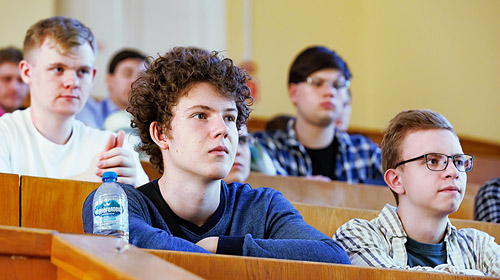
Electronic english version since 2022 |
The newspaper was founded in November 1957
| |
|
Number 4 (4752) |
Youth and science
Integrated approach: physics and computing
On 20 January, the JINR-based Dubna branch of Lomonosov Moscow State University (MSU) announced the opening of enrollment for a new Master's course "Techniques and technologies of data processing in heterogeneous computing environments". Document submission will open in June 2025. Pre-registration for the enrollment is available on the website of the branch. There are 10 state-funded and 10 fee-based quotas.

Head of the programme "Techniques and technologies of data processing in heterogeneous computing environments" is MLIT Scientific Leader Vladimir Korenkov. The teachers will be not only leading scientists and specialists of the Joint Institute for Nuclear Research, but also teachers from Moscow State University and other specialized universities, as well as from scientific and educational organizations.
In general, the Master's programme "Techniques and technologies of data processing in heterogeneous computing environments" is aimed at training specialists that have mastered the methodology of organizing computing for large scientific projects. Focus in the programme of the new area will be on mega-science projects in high energy physics and large scientific projects implemented at JINR. Graduates of the Dubna branch will know all stages of implementing these projects: design, simulation, construction of an experimental facility, development of a distributed computer system from the subsystem of accumulation, filtering, preliminary processing to the subsystem of organizing distributed storage, processing, analysis of data. At the same time, the programme includes close cooperation with JINR scientific projects in various fields of physics and radiation biology that allows flexibly selecting individual educational trajectories.
"The Faculty of Computational Mathematics and Cybernetics of Moscow State University and the Sarov branch of Moscow State University train highly qualified IT specialists. However, there is no targeted training of specialists in the field of large scientific projects in Russia yet. Therefore, opening this area in the Dubna branch of Moscow State University is crucial for us. These specialists will be able to understand the specifics of scientific experiments well from their student days and will be prepared to work in NICA, Baikal-GVD, JUNO and other mega-science projects. The programme of our area in the Dubna branch of Moscow State University will be unique due to the integrated approach, in which students will delve into both computing and the required physical disciplines," Vladimir Korenkov said. He also emphasized that the programme provides for advanced study of data processing and analysis techniques, including machine learning, neural networks and working with Big Data. In addition to parallel computing, the emphasis will be on training to work with distributed computing and distributed data storage.
Graduates of the Dubna branch will be able to successfully work in projects based on the use of heterogeneous computing environments, develop data computing systems to meet scientific tasks based on supercomputer simulation and data mining techniques, Big Data analytics, as well as neural network approaches, including deep learning neural networks implemented on new hardware platforms using graphics accelerators. The programme unites disciplines in software tools and prototypes for mega-science projects, distributed and parallel computing technologies, mathematical simulation, techniques for efficiently organizing the solution of complex problems on high-performance systems, methodology for organizing storage and data management in large scientific projects, and data management technologies in heterogeneous environments.
In addition, Vladimir Korenkov emphasized that studying in Dubna gives young scientists the opportunity to participate in advanced JINR research and to work on the unique computing infrastructure of the Laboratory of Information Technologies
"We certainly wish to train specialists for JINR first and foremost, yet I think that these specialists will be in high demand in other areas and not only in science. Advanced information technologies develop very fast. Industry, economics and public administration need people that can work with distributed systems for processing, storing and analyzing data. This is an extremely important area and here, I think, we will be at the forefront of education. At the same time, I hope that our traditions, our special scientific atmosphere will become a magnet that will not only attract young talents, but also give them a reason to stay and become part of the JINR staff," he highlighted.
Despite the high demand for the programme, there are no plans to increase the number of places in the near future. The organizers of the programme, as well as the whole MSU branch in Dubna, consider it paramount to provide an individual approach to each student that in addition to organizing an effective educational process, will allow them to be assigned to the topic of their master's project and to a team of leading scientists that will be able to pass on their experience to them.
Alongside the new programme, the Dubna branch offers two other Master's physics courses (10 state-funded and 10 fee-based quotas):
- "Particle Physics", headed by JINR Scientific Leader, RAS Academician Viktor Matveev;
- "Fundamental and Applied Nuclear Physics", headed by JINR Director, RAS Academician Grigory Trubnikov.
The Dubna branch is headed by Corresponding Member of the Russian Academy of Sciences Eduard Boos. MSU higher education diplomas are given in two languages. Master's students of the MSU branch are awarded a scholarship of 25 000 roubles and are provided a dormitory in Dubna.
A document confirming one's bachelor's degree and an examination are required upon admission.
If you have any questions, please contact the admissions office of the branch by phone number +7 (496) 214-74-21 or by e-mail priem@msu.dubna.ru.
Group "MSU Branch in Dubna" in VK